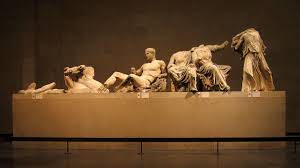The Elgin (Parthenon) marbles, consisting of sculptures and friezes, are displayed around the world today – about half of which in the British Museum, thanks to Lord Elgin, British ambassador to the Ottoman Empire in the early 1800s. By “rescuing” these artifacts from the “barbaric” Turks, Elgin believed he was doing a service to the art by preventing it from decay.
Today we must ask, to whom do the marbles belong? Taken from the Parthenon in Greece during a time of political turmoil, many people, including myself, believe they should be repatriated and reunified in the New Acropolis Museum in Athens. Others consider the marbles to be rightfully owned by the British Museum, and that repatriation to Greece would unfairly strip the museum of precious artifacts and displays. In considering these differing viewpoints, it’s important to realize who benefits (or doesn’t) from the repatriation process.

Despite it having been over 200 years since the Elgin marbles were first displayed in the British Museum, the issue of repatriation has still not been resolved. The museum argues that Elgin was in the right when he first obtained the marbles because the artifacts were already in disrepair. In addition, a Parliamentary Committee in 1816 affirmed the legality of the acquisition and display of the artifacts (British Museum – Parthenon Sculptures). But, just because it was deemed legal in the eyes of the takers of the artifacts, does not mean it was legal to the people of Greece! Even so, the current trustees of the museum argue that having the marbles in both London and Athens promotes an understanding of Greek culture, transcending political boundaries.
On the other hand, organizations such as the International Association for the Reunification of the Parthenon Sculptures (IARPS) have sent letters to the British government as recently as 2014, asking them to participate in the UNESCO mediation process proposed in 2010 by Greece for the reunification of the Parthenon marbles (IARPS). They consider the marbles to be illicitly acquired cultural artifacts. They are put on display in London for no charge, but considering Greece’s current debt crisis, I think displaying the marbles in Athens for a charge could be a form of economic repatriation.

In reference to Elgin’s actions, what the British Museum describes as acting with full knowledge and permission, IARPS describes as stripping and taking away. But, the British have refused to meaningfully discuss why Greece deserves the marbles back. These conflicting viewpoints provide insight into the complications of repatriation, belonging, and ownership. I believe that due to the political climate in what is now Greece at the time when the marbles were taken, they couldn’t have been justly acquired, regardless of any paperwork Elgin could have presented. There will never be a single right answer that every group involved can agree on – but hopefully there will come a point where it is the responsibility of the taker to address the concerns of those from whom cultural artifacts were taken.
Works Cited
British Museum – Parthenon Sculptures
International Association for the Reunification of the Parthenon Sculptures
Photo Sources

This is such an interesting case of repatriation to me, since it involves two nation states and is truly happening on the world stage. I remember learning about this issue in high school and one argument that was “for” the British Museum’s refusal to repatriate the marbles was air quality in Athens, although I have not heard this come up since then. I also believe the marbles should be repatriated and it seems ridiculous that they haven’t been, but my guess would be that the British Museum considers it too central an exhibit to let go of, as it really is one of their main attractions. I have actually been to the British Museum several times and have always wondered, frankly, how consent and repatriation figure into a lot of their collections. Your idea of “economic repatriation” is an interesting one! I would be interested to see how both Greece and the UK would respond to such a suggestion. It could at least be a good intermediary step while the repatriation process (hopefully!) happens.